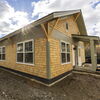The thrill is gone | Real estate experts say the stats don't lie: Maine's once hot housing markets are slowing, and the effect could be far reaching
In York County, for example, sales this year in June, July and August were 23.3% lower than during the same period a year ago, according to the Maine Real Estate Information System. The situation is much the same in Cumberland County, where sales dropped 16.4% during the summer months. (See "Anatomy of a slowdown," following page.) "The trend is that we're definitely selling fewer units per month," says David Whitten of Whitten Properties in Portland. "It's not as fun or exciting as it has been."
Many in the real estate industry insist, however, that the housing market is not as bad as it is often perceived or portrayed. Realtors say fairly priced homes still sell ˆ but it just takes longer for them to move. "It would be considered a good market if we didn't have the last four or five years [for comparison]," Whitten says. "We've arrived back to where we were."
Still, it's clear that the dynamics have changed ˆ and buyers are in the strongest position in years. Competition for homes is no longer fierce, and buyers no longer feel pressured to quickly choose. "Buyers knew [in recent years] that they had to make a decision within a week or that house would be under contract," says Van Wilkerson, an associate broker with ERA Today Realty in Falmouth. "Now, they can walk away, think for a month and the house is still on the market ˆ and it may have a price reduction."
Brokers say sellers have reluctantly come to understand that they have to be realistic when pricing a house, and that the glory days are over. "Finally, in the last couple of months," Wilkerson says, "sellers are realizing that the market favors the buyers and that days on the market are up. And you may have to do a price reduction, or several, if you're in a hurry."
The housing market, of course, is cyclical, just like most segments of the economy. Real estate booms and slows, and if a market gets hot, it will someday cool. "As with anything," says Valerie Lamont, director for the Institute of Real Estate Research and Education at the University of Southern Maine, "whatever goes up must at least plateau, if not come down."
Despite the market's current condition being part of a normal cycle, some observers say the recent real estate slowdown could have implications for more than just buyers, sellers and brokers. To Frank O'Hara, a Hallowell-based analyst for the economic research and planning company Planning Decisions, conditions in today's real estate market look similar to the housing environment that led into recession in the early 1990s. "Everyone in the housing industry remembers the early 90s," O'Hara says. "It was dreadful. That's the gold standard of bad experiences."
Dragging down the economy
O'Hara says Maine home sales and housing construction started to decline in the late 1980s after a long boom, and eventually drew the entire state into economic recession. Home values stayed steady until the recession was well under way, then began to decline. History seems to be repeating itself, O'Hara says, with home and construction economies again slipping. "It's not nearly as dire a situation as in 1989, but it is the same situation," he says. "You can't say the housing economy is leading Maine into a recession. But the housing economy is certainly weakening."
O'Hara says it is important to remember the significance of the real estate market, even if you're not buying a house. That's because real estate and construction are major employers, the market is such a good indicator of larger economic trends and housing construction leads to economy-boosting purchasing of materials and domestic goods. "After people build houses," he says, "they have to fill them up."
Though he says low levels of consumer confidence and other factors may signal a weakening economy, O'Hara isn't a pessimist. He says trends favoring Maine ˆ such as a coming wave of retiring baby boomers likely to bring a construction boom ˆ will boost the economy here. But now, he says, there's a waiting game underway. "The housing market is at a standstill," he says. "The sellers are refusing to go down and the buyers are waiting. It's kind of a cat-and-mouse game."
Some analysts, however, are dourly pessimistic. O'Hara notes that Nouriel Roubini, founder of New York-based Roubini Global Economics, has said that nationally "this is indeed the biggest housing slump in the last four or five decades" and "every housing indicator is in free fall." Roubini also says that "this slump is enough to trigger a U.S. recession."
Likewise, Moody's Economy.com, a respected Pennsylvania consulting firm, predicts many metropolitan areas will see sharp housing-price declines through 2009, with some markets, from Washington, D.C., to Reno, Nev., seeing price declines of 12% to 19%. Moody's predicts a price decline in the Portland area of 5.9% ˆ a greater drop than it forecasts for Boston (2.2%) and Providence (3.6%).
Foreclosures also are on the rise: The statewide foreclosure rate in September, for example, was 171% higher than during the same month a year ago. "That's to be expected when the economy slows," Lamont says. "That might put more inventory on the market than we have now, and it might also have an effect on prices."
Welcome bargain hunters
Significant home price decline isn't predicted by the local experts interviewed by Mainebiz. Though many note that real estate markets are notoriously difficult to predict, most say they are relatively optimistic about the state and future of Maine's housing market. "It's still holding its own pretty good," says Brenda Fontaine, a realtor in Auburn. "You just can't overprice property and try to reach for the sky like sellers were doing in the last few years. You can get fair-market values, but you can't go over it."
Whitten is also an optimist, believing the quality of life in his market, Portland, will keep a significant slowdown at bay. "It's a big enough town and has such a great reputation that it attracts people from far and wide," he says. "Portland is immune, to some degree, from the downturn."
Still, the slowdown means today's real estate market is far different from the market of just a few years ago, realtors say. And for brokers who are relatively new to the job, it's a very different experience. Wilkerson, for example, became a realtor five years ago, and says he's today seeing what for him are new phenomena. Recently, he said, a local home sale was stalled when the buyer, who was relocating, couldn't sell a house near Boston. "I'd never had an occasion where someone in Massachusetts couldn't sell a house," he says. "If people said they had to sell a house in Massachusetts, I never worried whether they could do it."
Realtors and experts say there are more homes on the market now than there have been in years, meaning buyers have much from which to choose. They also stress that a slowing market is beneficial to many. A less competitive market is aiding some buyers, particularly first-time buyers, who in recent years found themselves thwarted by skyrocketing prices. "There are people out there," Lamont says, "who want to buy who have not been able to get into the market and are now looking for bargains."










Comments